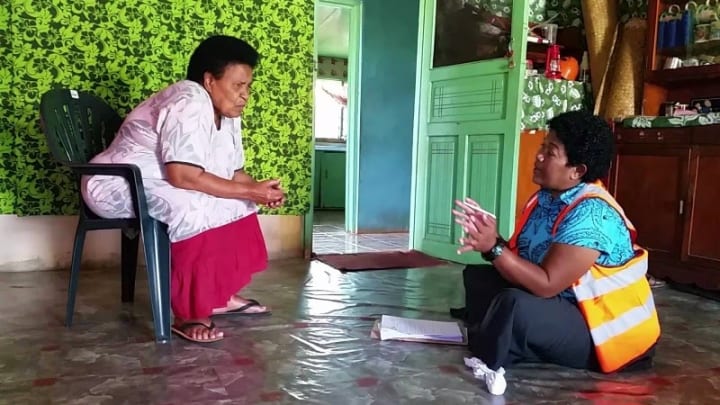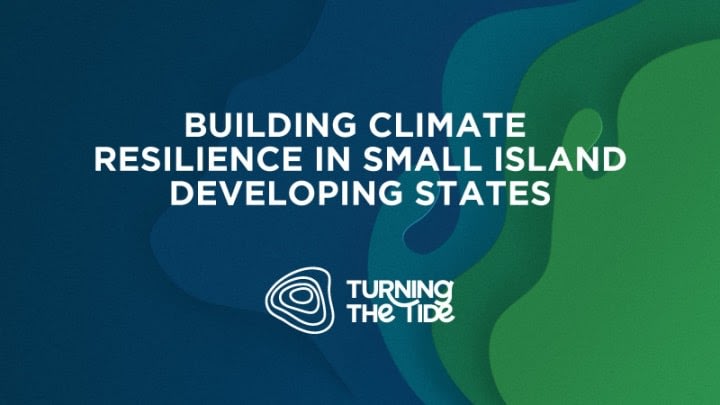
BARCELONA — When a disaster such as a cyclone or a flood occurs, both of which are becoming more frequent as a result of climate change, urgent needs including shelter and water supplies are already difficult to address — let alone the effects of trauma or other potential psychological consequences. However, experts agree that extreme weather events and climate change have both short-term and long-term effects on mental health.
“After a cyclone, there is an increase in mental health and psychosocial issues,” said Dr. Yutaro Setoya, World Health Organization country liaison officer for Tonga and mental health specialist. According to Setoya, in the aftermath of cyclone Gita which hit the island state of Tonga in the southern Pacific Ocean in 2018, these psychosocial impacts became apparent through an increase in drunk driving, accidents, and violence.
However, the mental health sector is “chronically underfunded” according to a new report released by WHO on World Mental Health day on Oct. 10, highlighting the urgent need for increased investment. It also showed that the COVID-19 pandemic has disrupted or halted critical mental health services in 93% of countries worldwide, at a time when demand for mental health is increasing.
“Many countries spend less than 1% of their health budget on mental health, which is not enough. And we believe that we have cost-effective treatments and options available.”
— Dr. Yutaro Setoya, country liaison officer for Tonga, WHO; mental health specialistBut WHO is struggling to raise the agenda of mental health itself within wider climate change discussions.
“Even health is struggling, so you can imagine how mental health is struggling to get into the climate change agenda,” Setoya said.
Immediate and long-term mental health impacts
The immediate response following a natural disaster is focused on health issues and recovery, but after a few weeks you start seeing the mental health impact, Setoya said.
More on mental health:
► The pandemic takes its toll on women and girls' mental health
► Can online therapy help narrow the mental health treatment gap?
► Which bilateral donors are supporting mental health? (Pro)
“Any disaster situation will increase stress. There’s acute stress, but also accumulated stress from not having a house for a long time … and maybe people fall into poverty,” he said. There is also an increase in mental disorders like anxiety disorder, depression, and post-traumatic stress disorder. Any stress will also increase the possibility of psychosis and schizophrenia, Setoya added.
Others face grief, survivors guilt, and suicide ideation, according to Prem-Lata Singh, mental health specialist and regional clinical supervisor at Empower Pacific, which provides social services and counseling — including psychosocial support — in disasters, including through psychological first-aid volunteers. “The helplessness and the hopelessness combined with financial constraints can lead to suicidal ideations or attempted suicide,” Singh said.
Disasters also often trigger migration as individuals whose land or livelihoods have been damaged are forced to look for employment in urban areas. This can break up families and relationships, adding to emotional stress and children witnessing the disintegration of family bonds, Singh said. “All of these things are quite evident and we can also say it’s directly related to climate change,” she said.
Despite more research around the mental health effects of disasters in recent years, there’s little evidence of the long-term mental health consequences of climate change. This is partly because it’s difficult to measure the impact of something like losing your land, having to resettle or, becoming a refugee, Setoya said.
Additionally, in some cases people are only feeling the effects slowly. For example, in some coastal areas in Tonga, the land is washed away gradually, forcing people to resettle or replace their houses, which Setoya says could have long-term mental health effects.
The Lancet Countdown, a research collaboration bringing together experts to track how climate change is affecting health, is working on creating an indicator to better understand the link between the two. In 2018, it found that climate change aggravates risks to mental health and well-being when the frequency, duration, intensity, and unpredictability of weather-related hazards change.
“It’s quite difficult to isolate the reasons for why a mental health issue like depression will be triggered,” said Sonja Ayeb-Karlsson, senior researcher at the Institute for Environment and Human Security at the United Nations University, and one of the authors of the latest The Lancet Countdown report.
Having faced a cyclone, individuals might grapple with the loss of family members or their house. “[Losing] belongings and things like a house can feel like losing memories, losing part of your identity and yourself. But it’s difficult to isolate because there’s so many reasons,” she said, adding that it’s possible to see these effects developing over time.
Women and children most at risk
Children are a particularly vulnerable group as disasters are often difficult for them to grasp, but also because of anxiety and fear that a natural hazard could happen again, she said.
In a recently published study on “gendered disaster (im)mobility and wellbeing loss in coastal Bangladesh” conducted by Ayeb-Karlsson, children would ask their parents things such as “‘is the flood going to come tomorrow? ... Are we going to have to evacuate? Are you going to save me?’” she told Devex.
Women are another particularly vulnerable group as disasters increase the risk for gender-based violence, Singh said. To address this, Empower Pacific provides long-term counseling support for behaviour modification.
“Anger management and teaching the perpetrator about the long-term impacts of violence on their children ... is the very best way for a quick turnaround,” Singh said, adding that the organization employs young, male counselors who teach men that it’s okay to ask for help and to voice what they are going through.
Training and capacity building
WHO’s Setoya, who is based in Tonga but manages mental health issues in 14 Pacific countries and seven territories, supports ministries of health to strengthen their mental health systems.
“Services are needed at all levels and we need to train specialists, especially on stress-related disorders,” he said. In addition, they train general doctors and nurses on simple counseling, but also first responders on psychological first aid, he added.
In Pacific Island nations — because there are such small population sizes — having a psychiatrist or mental health doctor is already difficult, he said, adding that in some island nations there may not even be a single psychiatrist.
WHO, together with partners, are offering scholarships for doctors to go abroad and bring back skills as psychiatrists. They are also integrating mental health into general medicine for doctors and nurses in the public primary health care system.
“We have a training called Mental Health Gap Action Programme which trains general doctors, nurses, and secondary health care and primary health care to be able to assess and manage common mental disorders like depression, alcohol disorders, psychosis, and suicide,” Setoya said.
He noted that it is also very important to inform the general population that it is natural to feel stressed after a disaster, and to encourage them to contact health staff if they have prolonged or severe symptoms.
Tackling stigma and raising awareness
Singh noted that in remote villages in Fiji there is a limited understanding about what mental illness is and the role of psychiatric services. This causes another barrier to mental health support: stigma around being mentally unwell.
According to Singh, part of Empower Pacific’s work on mental health in Fiji is still stigmatized, which is why the community outreach program in part focuses on building awareness among children, young individuals, and the elderly. “We are teaching people about mental health conditions — that it’s just a condition, you can be treated for it, and it should not be stigmatized,” said Singh.
As climate change exacerbates economic strain, forced migration, and trauma, efforts to increase access to mental health services will require increased priority and funding from the global health community and national governments.
“Many countries spend less than 1% of their health budget on mental health, which is not enough. And we believe that we have cost-effective treatments and options available so we ask them to invest in mental health and to increase the mental health workforce,” Setoya said.
Visit the Turning the Tide series for more coverage on climate change, resilience building, and innovative solutions in small island developing states. You can join the conversation using the hashtag #TurningtheTide.





